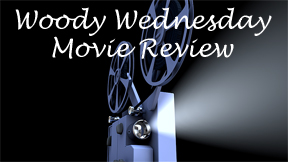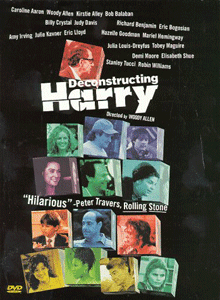“Deconstructing Harry” (1997) is a fascinatingly constructed film. Writer-director Woody Allen plays the titular author who gets ripped by his friends and family for using them as inspiration in his novels. Harry runs into these pseudo-fictional creations as he gradually loses his marbles.
We see Harry’s real life at various points in time, where he’s dating Elisabeth Shue, married to Kirstie Alley, and married to Amy Irving. Harry also has a fling with Judy Davis, and is friends with Billy Crystal (who also plays The Devil) and Bob Balaban.
Among Harry’s fictional characters – who are either shown in fictional scenes (that stand in as exaggerated moments from his life) or who interact with his psyche – are Tobey Maguire, Jennifer Garner, Stanley Tucci, Julia Louis-Dreyfus, Robin Williams and Demi Moore.

“Deconstructing Harry” (1997)
Director: Woody Allen
Writer: Woody Allen
Stars: Woody Allen, Judy Davis, Julia Louis-Dreyfus
Saved in editing?
“Harry” deserves consideration for having the biggest-name cast ever assembled, and Allen uses the talent roster well. I can’t say I totally grasped what level of “reality” is shown in every scene, but the film flows well enough that I got into its groove.
Susan E. Morse, who edited all 20 Allen films from “Manhattan” (1979) through “Celebrity” (1998), doesn’t edit every movie the same way. She has edited some comedic and dramatic masterpieces, of course.
But I noted that she didn’t save the throw-it-at-the-wall directing style of 1994’s “Bullets Over Broadway.” Morse’s work on “Harry” plays like a conscious response. Allen’s takes are again loose, but Morse tightens many scenes via snipped frames within the shot. This is initially disconcerting, and she knows it, so she prepares/warns us with a choppy opening scene of Louis-Dreyfus exiting a cab.
I can’t say I liked this editing choice, but I got used to it. Morse doesn’t overuse it. She lets scenes breathe when appropriate, and lets punchlines land. I trust she was removing garble to pick up the pace.
Just plain funny
As complicated as “Harry’s” style is to summarize, it’s ultimately a great film because it has many funny sequences. I laughed the most at the Alley-Allen vignette.
Alley is a shrink who had married Harry thinking she could work with his neuroses, but of course she is no match. She works out of their apartment, where he also does his writing, and has just learned he has been sleeping with one of her patients. Alley politely excuses herself from her current patient several times to unleash curse-laden spews at Harry. (“Harry” has more swearing than the average Allen film, another thing that takes some getting used to.)
In a briefer scene, Richard Benjamin (Harry’s fictional self) is engaged in secret sexual intercourse with Louis-Dreyfus at a party when an older relative walks in on them. Luckily, this lady can’t see well. This was two years before “American Pie,” but it’s like a scene from that franchise, only with middle-aged adults. (Come to think of it, the next “American Pie” film will probably be like this.)
“Harry” isn’t all broad setups. In a subtly humorous scene, Irving tells sister Davis that Harry has dumped her for another woman. Davis’ facial expressions and body language demonstrate that she is secretly happy: She thinks she is the other woman. Then she finds out it’s a random 25-year-old and she is crushed.
Writing his own life
Allen creates a lot of funny scenes in “Harry,” and that’s why I like it. I can’t quibble about the broader theme, either: Harry is bad at life, but he’s great at writing. He lives his life through his fiction, putting mundane real moments into a profound dramatic context.
A decent grand finale outwardly completes Harry’s inner journey. Harry, his young son, friend Balaban and kindly hooker Cookie (Hazelle Goodman) travel to the college where Harry was kicked out but now is being honored for his lifetime achievements. A twist borrowed from “National Lampoon’s Vacation” lands pretty well.
Throughout the film, we see standard Allen characters and situations unleashed like we’re on an amusement-park ride rather than a cozy little dramedy. Paired with Morse’s unusual editing, this could’ve been a misfire borne of trying too hard to be different.
But because “Deconstructing Harry” hits the funny bone often and makes a strong thematic point, it ranks in the upper tier of Allen’s catalog. Even if his real-life inspirations are angry about it.


